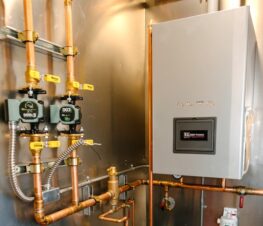One of Pennsylvania’s oldest and largest school districts has opted for advanced technology to solve an age-old problem: precise temperature control for domestic hot water, installed for pragmatic reasons and as a valuable “insurance policy.”
The Bethlehem Area School District (BASD) has been around since the 1920s. The sixth largest school district in Pennsylvania, BASD covers more than 40 square miles and has 14,000 students enrolled throughout 22 schools, including two high schools, four middle schools, and 16 elementary schools.
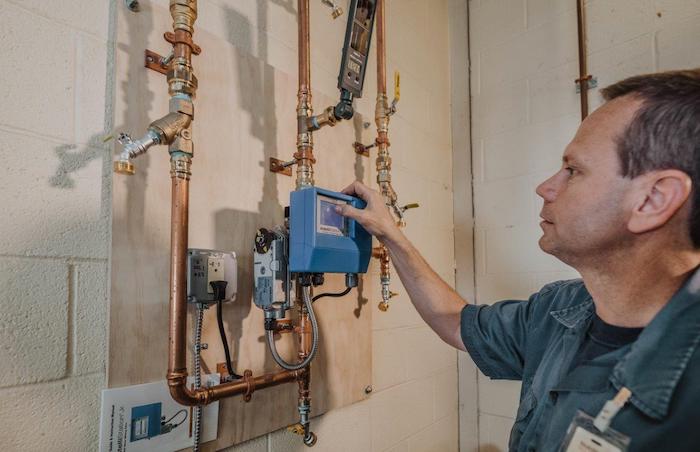
Scott Yandrasitz, BASD master plumber, completes the IntelliStation Jr. install.
The school buildings, dating back nearly 100 years, have seen their fair share of mechanical systems. The latest: mechanical mixing valves that have far outlived their lifespan.
According to one of BASD’s full-time master plumbers, Scott Yandrasitz—in 2010, the district managers dove headfirst into an effort to modernize plumbing and mechanical systems throughout the century-old school district, beginning with the building of their first green-certified school.
Supervisors of facilities at Bethlehem Area School District say, “Just because we’re an old school district doesn’t mean we can’t have the latest and most advanced technology.” BASD’s modernizing effort snowballed from there.
In August 2018, the district’s manufacturers’ rep for all things mechanical—Warminster, Pa.-based Vernon Bitzer—came through with an ultra-modern solution for the buildings’ outdated domestic water mixing valves.
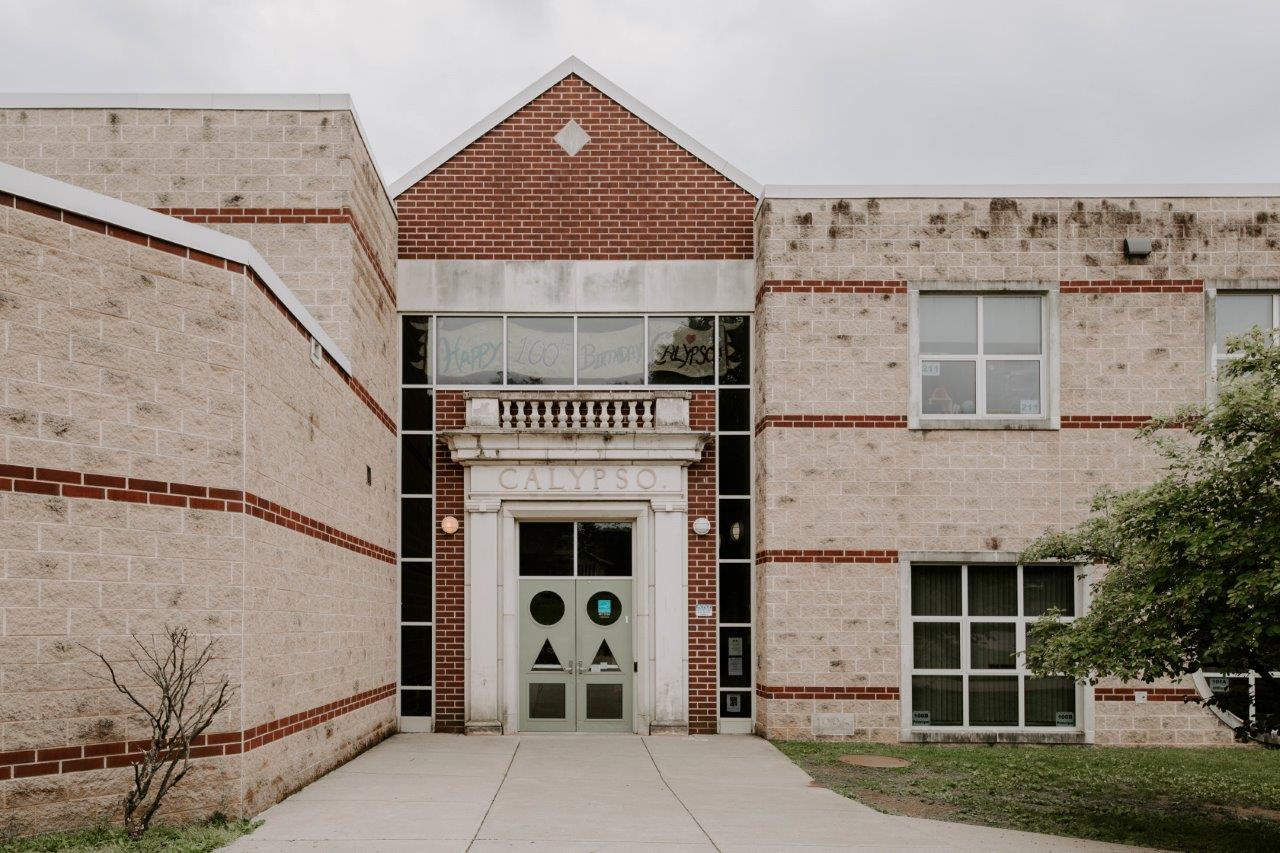
“The old systems were leaking and deteriorating,” said Vernon Bitzer’s Dick Filer (recently retired). “They had far outlived their lifespan.”
“At the beginning of each week, when we’d walk into the mechanical room, we’d check the systems and the temperatures had always drifted several degrees,” added Yandrasitz. “We wanted a solution that would be something similar to what we already had, but we needed a solution that would be precise, reliable, and would also eliminate the need for routine maintenance.”
“The old systems had too many moving parts,” said Carlo Angelone, another BASD master plumber. Invariably, there was always something to deal with. “Each school’s domestic water system had two mixing valves: one for high flow and one for low,” he noted. “By their nature, the many moving parts were prone to challenge, and as they aged, we were faced with the need for constant maintenance and repair.”
Catch 22
According to Filer, facility managers are typically caught in a mechanical systems Catch 22: turning down domestic water storage temps ensures reduced risk of scalding, yet greatly increases the risk of germ proliferation—including the infamous legionella bacteria, the source of Legionnaires’ Disease. Yet, bumping up storage temperatures increases the risk of scalding.
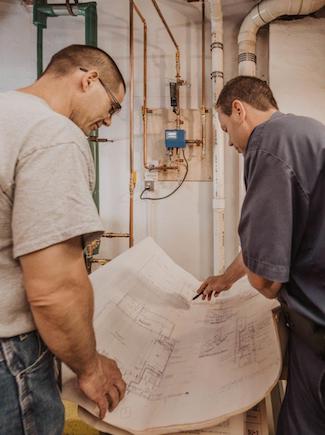
Carlo Angelone, BASD master plumber (l) and Scott Yandrasitz, BASD master plumber, look over the install diagrams.
Filer’s suggestion was the Powers IntelliStation® Jr.—a Watts brand product for smart digital water mixing and recirculation. The technology would give facility managers the precise temperature control they wanted and also integration with BAS to allow remote monitoring and control.
The IntelliStation Jr.’s sanitization mode addresses waterborne bacteria while a programming schedule for the set-back of temperature improves energy efficiency when the building is unoccupied. It controls water temperature to a +/- 2°F for enhanced safety, prevents overnight creep, and automatically balances the hot water distribution system during low-to-zero demand periods—all ideal features for a school building application.
Yandrasitz and Angelone, along with the district’s master electrician, Chad DePaolis, and Bitzer’s Filer, presented the solution to the supervisor of facilities, who approved their plan enthusiastically.
First digital mixing upgrade
Eager to test out the new technology from Watts, BASD plumbers installed the first IntelliStation Jr. in Freemansburg Elementary School—which, up until that point, had the greatest number of repairs.
With three master plumbers and three master electricians employed by BASD, they were able to avoid outsourcing the work to contracting firms.
Having in-house resources for quality installation and maintenance was a substantial advantage, but they quickly learned that ease of installation and commissioning, and operational reliability were the decisive factors. All the experts agreed: digital mixing valves would become an answer to many of the challenges they faced, district-wide.
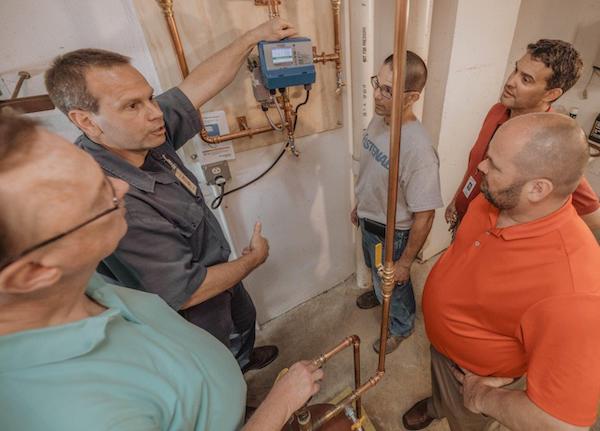
From left to right: Dick Filer, Vernon Bitzer (retired); Scott Yandrasitz, BASD master plumber; Carlo Angelone, BASD master plumber; Chad DePaolis, BASD master electrician; David Steele, Vernon Bitzer. Yandrasitz demos the IntelliStation Jr. to the group.
“I believe that, in five years, digital mixing valves will be predominant,” said Vernon Bitzer’s David Steele, who took over Richard Filer’s role of working with BASD after his retirement. “I think they’ll be predominantly used for their ease of maintenance, accuracy, and flexibility in today’s age of low flow fixtures.
“Digital mixing will most likely migrate from the water heater to other items,” he continued.“ There will be smarter technology for many items throughout the plumbing system. We’re proud to be a Watts rep and are clearly devoted to our future with IOT.”
Plan for the future
According to Yandrasitz and Angelone, BASD managers recently received three more IntelliStation Jr. systems now slated for installation. For the 2018 budget submittal, they stated the need to purchase three more of the systems for 2019. And in ’99, they requested more for 2020.
“The way I see it,” said Yandrasitz, “we’ll continue budgeting for them at three or more a year. We have at least 20 schools that will need them, and the improvements have won the admiration of senior managers without fail.”
“Less maintenance and greater accuracy of water storage and distribution temperature control—this is just what we need for our schools,” he said. “There are other advantages to digital mixing, including the ease with which we’ve been able to disconnect the old mechanical mixing systems and to install and commission the new digital mixing technology. When the control is in place, connected and online, we simply set the new temperature parameters, and the computer controls everything, regardless of the level of water use and flow.”
An electrician’s friend, too . . .
DePaolis, says the IntelliStation Jr. meets his exact requirements. “The system is an incredibly easy hook-up to electricity and to building management systems. It’s user-friendly and there’s no maintenance for me once it’s in and operational.”
BASD’s second IntelliStation Jr. was installed in Calypso Elementary School in February 2019.
Lack of complaint calls–no lack of hot water
According to several members of the installation team, if a school doesn’t have hot water, complaint calls and emails come in from everywhere—from administrators, teachers, and parents. That means team members receive urgent calls and texts from administrators, and those can be unpleasant.
“Since installing the new digital mixing valves, we haven’t received a single complaint call for hot water loss,” said Yandrasitz. “That’s a good thing. And it’s one of the measures of success for us, that’s for sure.
“The more important assurances we’ve had with the successful operation of the digital mixing systems have been reliable operation and easy control of the domestic water system storage and delivery temperatures,” he concluded. “We know we made the right decision. We’ll have more orders for the technology soon.”

